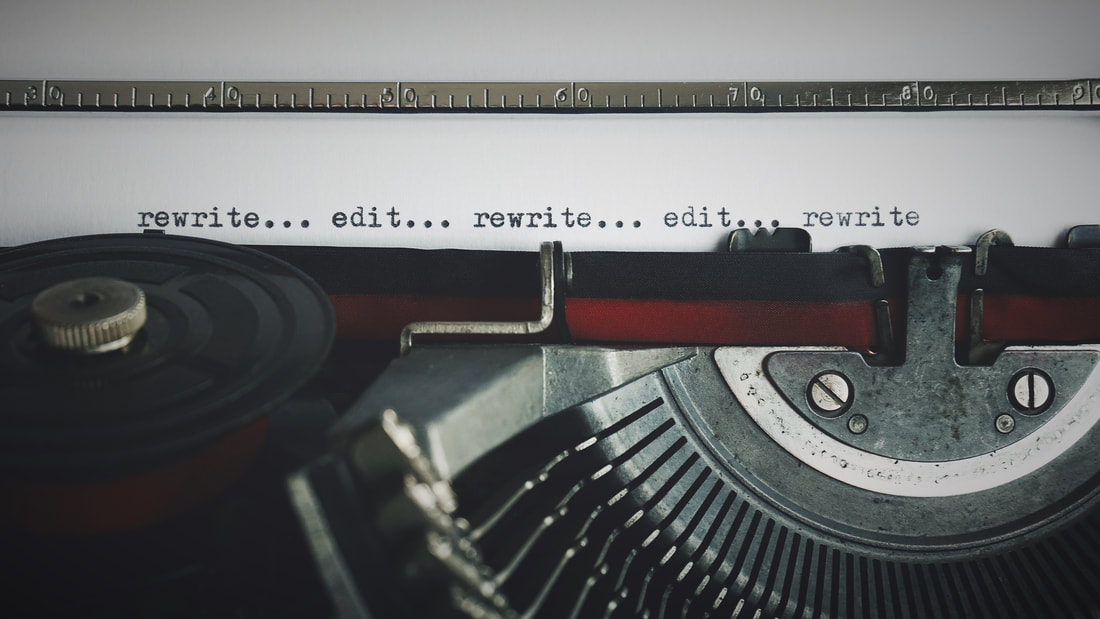|
If you asked the average person what an editor does, you’d probably get answers that range widely. Some consider editors little more than overpaid spellcheckers, while others think they ruthlessly rip manuscripts apart and suck the creativity out of them to cater to the market. Perhaps you think of editors as colorless little people hunched over a desk, scribbling on a page in red ink in some dark back office. Or you see them as arrogant-professor types, looking down their nose through spectacles at the “atrocious state of grammar today.” (See my article from a couple weeks ago on the grammar police.) If you’ve even ever given a thought to the editing process. In fact, editing is a much more complex and human process. I work primarily with copyediting, but there are several other specializations that focus on each step of the publishing process, though some of the specializations often overlap, depending on what services a particular editor offers. And freelancers are creating new niches all the time as they see a need in the market. If you go through a traditional publisher, your agent and the publisher will walk you through the process and even decide how much and what kind of editing your manuscript needs. Though you might not need more than a writing group or writing coach to get your manuscript into good enough shape for the publisher to accept it, it still pays to be informed on who all might be involved in the process. However, if you decide to go the self-publication route, it’s up to you to decide on and acquire the necessary help, because let’s be honest here—your sister-in-law might have aced her high school English classes, but there’s a lot more to preparing a manuscript for publication than knowing where to put a comma! Some editing tasks can be left to writing groups, peer review, and beta readers, while others can’t. Then, there are budget considerations. You can’t make wise choices if you don’t have the facts. I’ve outlined some of the more common editing positions. Writing CoachWriting coaches often work with authors who are just starting out and don’t even have a rough draft yet. They help with idea and story development, as well as improving general writing skills; they deal with the big picture. They perform a function similar to that of writing groups, but because writing coaches are professionals in the industry, they can offer insights that other writers, who are often just starting out themselves, may not be able to. However, neither writing coaches nor any other editors will write your manuscript for you. Some might help with rewriting passages, but if you want someone to take your ideas or outline and create the manuscript, you’re looking for a ghost writer. Developmental EditorLike writing coaches, developmental editors work on the big picture, though they require a completed manuscript to work with. They work with large-scale organizational and structural issues. They won’t rewrite anything for you, but they may suggest cutting or reordering chapters or scenes. Or they might suggest a completely different direction that you didn’t think of but ends up being more natural and interesting to your readers. Substantive EditorSubstantive editors begin to focus down to the chapter, paragraph, and even sentence level. They might revise or even rewrite whole sections of text, something generally beyond the scope of a copyeditor. However, they don’t generally mess with the plot or core message. They focus on awkward, convoluted, or confusing passages to help that plot or message shine through more clearly. You might hear them referred to occasionally as line editors as well. CopyeditorCopyeditor is one of those terms that means something different to different people. We can’t even agree on how to style the word itself! Is it copyedit, copy-edit, or copy edit? It all depends on the preferred style and personal choice. I tend to follow Chicago style myself, thus the closed compound, but the other two aren’t wrong. I choose to divide the levels of editing into heavy and light copyediting to avoid confusion and be able to tailor the editing to a particular manuscript, though the heavy copyediting can start to edge into substantive editing at times. Generally, though, copyeditors work more on the word level, correcting mechanical and style issues and flagging any possible issues with inconsistencies, obvious factual errors, or permissions needed. They make sure the words say what the author intended. They might call attention to structural or organizational issues, but it’s then up to the author to fix them. Remember that though copyeditors will point out big-picture issues, it’s in your best interests as an author to have all those worked out as much as possible before hiring a copyeditor. If you have to do a bunch of rewriting, your work will have to go back to the editor to check the new passages for errors, ensure that no new errors were introduced elsewhere in the process, and check that the rewritten parts flow seamlessly into the rest of the manuscript. Essentially, you’ll be starting the editing process over, costing you time and money. If your editor can even schedule you in beyond the agreed-upon scope of the project. Fact CheckerSome copyeditors include fact checking with their other services. Others do not. Fact checking is a separate specialized skill and essential for any manuscript that relies heavily on facts and data, such as in the case of medical, scientific, or academic writing. While a copyeditor might flag obvious errors—like a passage that has the American Civil War beginning in 1961—fact checkers carefully comb through the text to ensure that even the most obscure facts line up and can be verified. Typesetter and DesignerTypesetters and designers aren’t technically editors, but I’ve included them to point out that these processes are a separate step from editing. They establish how the final edited words and any other elements like photos, graphs, or block quotes will look on the page. They’re concerned more with the aesthetics than the content. Proofreader People often confuse the mechanical editing part of a copyeditor’s job with proofreading. However, proofreading is a separate step in the process, though no less important. Proofreaders are the last line of defense in making sure all errors are removed before publication. The name literally spells it out. They read the typeset proofs to catch any errors missed by the copyeditor or introduced by the typesetter. It’s also a good idea to hire a proofreader who isn’t also the copyeditor. Doing so isn’t about calling into question the skill of your copyeditor, but it’s helpful to have a fresh set of eyes for one last pass. When you’re fully immersed in a project, it can be easy to overlook errors and see what you meant rather than the actual words on the page. That’s why even editors get someone else to edit their writing. SpecializationsIf all of that isn’t complicated enough, there are a few other considerations in choosing the right editor for your particular job. Even traditional publishing houses have genres they specialize in, or they have separate departments within the organization that specialize. And it’s the same with freelance editors. It just makes sense that you wouldn’t expect your mechanic to diagnose and treat your cancer, right? Why would editing be any different? Some editors are more specialized than others. So, one might work on everything from blog articles to indie fiction novels, while another might work exclusively with science fiction. If an editor can’t even tell you what DNA stands for, how are they going to catch errors in your medical text? Especially if it’s aimed at an audience of other medical professionals. It’s not about one editor being better than another, rather about choosing the right professional for the job at hand. Louise Harnby and Denise Cowle gave an excellent explanation of when and why you might want to hire a specialist editor on a recent episode of The Editing Podcast. It’s well worth a listen if you're interested in more info on this subject. Other Aids and AlternativesIn a perfect world, you would hire a professional for every step of the process. But not everyone—especially self-publishers—has the resources. Fortunately, there are alternatives for some of those steps. While not as well-trained as an editor, they can help to cut down on the amount of time an editor might need to spend on your manuscript, especially in the developmental stage, saving you money. A light copyedit generally costs less than one that involves more corrections and rewriting. Writing groups can often help you with areas where you might have hired a writing coach. You can find these peer groups all over the place: Facebook, your local library, local clubs and groups, and various online forums. Beta readers are a good choice if you’re looking for something along the lines of developmental editing. Remember that they aren’t trained the way a professional would be. Their input, though, could help you get an unbiased take on how your potential readers might receive your writing. Friends or family are usually the cheapest and easiest to find. They’re best employed as first readers, while your manuscript is still pretty rough. It can be difficult to get an objective, unbiased opinion from them because they know and, presumably, like you. Also, they may not represent your target audience. But they can be a cost-effective way to iron out the major wrinkles before turning to more formal feedback. You might be able to exchange services with other writers, where you look over and critique their manuscript if they do the same for yours. It’s a bit like a writing group, except on a smaller scale. Just remember that involving a skilled professional, especially at the later stages of editing, will pay for itself when you’re self-publishing. Your readers will only tolerate so many typos and awkward passages before they abandon you for another of the hundreds of other authors out there. But not before leaving a scathing review. Rebecca Miller is a professional copyeditor and general fan of all things having to do with the written word and the English Language. You can check out her website at Oakdale Editing or connect through Facebook, LinkedIn, or Email.
0 Comments
Leave a Reply. |
AuthorRebecca has a passion for helping you fill the world with great literature and making sure said literature doesn't get passed over for the lack of a little editing. Archives
July 2022
Categories
All
|


 RSS Feed
RSS Feed
